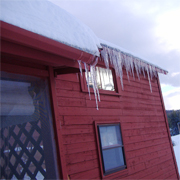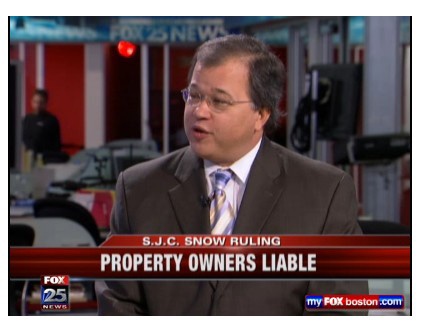Posts Tagged ‘“slip and falls”’
Attorney Marc Breakstone Reaches $825,000 Settlement for Client Who Slipped on Icy Ramp

Attorney Marc L. Breakstone recently negotiated a settlement for a woman who was seriously injured when she slipped on an icy ramp. The ramp was on a commercial property.
Read about Attorney Breakstone’s work.
Heaving Snow Posing Risk for Homeowners and Roofs
 A young woman’s death after heavy snow caused a roof collapse in Weymouth has officials warning the public to watch out for their homes.
A young woman’s death after heavy snow caused a roof collapse in Weymouth has officials warning the public to watch out for their homes.
On Thursday, a 29-year-old woman was killed when a carport collapsed on her. The woman was talking on the phone while sitting on the porch steps of a Harlem Road home. The Massachusetts Emergency Management Agency (MEMA) has issued a warning for the public to clear off their home roofs and storm drains in their neighborhoods to minimize flooding problems.
While we expect snow in Massachusetts, it has challenged drivers and caused numerous school day cancellations this season. Piles of snow have hampered visibility. Drivers are navigating a maze of snow-packed and slushy roads along with dangerous potholes and, which are starting to appear in the melting.
In addition to the Weymouth woman’s death, a barn collapse in Framingham killed three cows and injured four others this week. At the Burlington Mall, a water main break trapped a vehicle in a large sinkhole. The mall was closed but expected to re-open today.
It may seem like a record-setting season, but not this year. Yes, we are already 25 inches above the average season’s snowfall. But earlier this week (before the snowfall) the Boston Herald reported that while Boston had seen 53.5 inches, 1995-1996 was the record snow year, with 107.6 inches. The National Weather Service has predicted this season will not even make the top 10 list for heaviest snowfalls.
When snow piles up, some roofs are vulnerable to collapse, especially when there are numerous snow storms combined with rain and overnight melting. Flat commercial roofs are at the greatest risk. This year, while the snow may not appear that deep, some of the storms have dumped heavy wet snow, and that has been followed by soaking rains. The loads are immense.
How to remove snow from a roof is a challenge. Homeowners can attempt to clear it themselves with a snow rake, which can be purchased at most hardware stores. But you should never use a snow rake from a roof. You should clear the snow from the ground to avoid the risk of slipping and falling and head injuries.
Unless you are experienced, avoid ladders, which can be extremely slippery. The other thing to know is that metal snow rakes can conduct electricity if they come into contact with a power line.
Often by this time of year, a roof may require a professional treatment because of repeated snow storms and winter freezing. If that is the case, call someone who is experienced and insured for this type of work. They should be insured in case they damage your home, and they should also carry worker’s compensation insurance for their employees. You have the right to ask for proof of insurance, and you should.
Finally, do take some time to shovel your walks and your stairs. It the safe and the neighborly thing to do.
Read More
Massachusetts Property Owners Have a Legal Responsibility to Clear Snow and Ice
If you are a property owner, today is a good time to inspect your driveway and walkways. Even if you worked hard to clear all the snow yesterday, go out and take a second look. The deep freeze is setting in and more snow is forecast for tomorrow, creating the potential for slip and fall accidents.
Why is this important? In addition to making it easier for your family to come and go from your home, you have a duty to use reasonable care to clear snow and ice under Massachusetts law. If you neglect this, you could be liable for any injuries that result.

Massachusetts Law on Snow and Ice Removal The law for clearing your property is more strict than in past years. It changed in 2010, with the Massachusetts Supreme Judicial Court’s decision in Papadopoulos v. Target Corporation, SJC-10529 (July 26, 2010). View TV interviews from 2010/2011 in which attorney David White explains the law.
Prior to then, property owners were liable for injuries sustained on what was known as “unnatural accumulations” of snow or ice. Examples of this are gutters leaking onto sidewalks or snow piled on sidewalks.
The state’s high court changed the longstanding law so it falls in line with other states. Massachusetts property owners now have a responsibility to keep their premises in a reasonably safe condition and clear all snow and ice, whether it is a natural accumulation by Mother Nature or pushed there by a plow.
This law applies to homeowners as well as commercial property owners.
A few points to remember when it snows:
- You have a responsibility to clear your driveway, sidewalks and other areas accessible to the public.
- If you are using a snow blower, remember a shovel for narrow and hard-to-reach areas.
- Do you have the physical ability and time to clear your snow this year? If not, consider contacting a snow removal company.
- Cities have responsibility for clearing sidewalks, but some have ordinances requiring residents to clear their own. These include Boston, Worcester and Newton.
Safety
We all have to balance our legal responsibility to clear the snow with safety. It is hard work and tempting to take shortcuts at times. Remember a few basic safety rules. Do not start your snow blower in your garage or other covered areas. Before you shovel your driveway, clear your home’s heating vents so carbon monoxide does not build up in your home. Then, make sure you dress in layers and take breaks as needed.
Related:
Snow removal law may face test, Boston Globe, Dec. 25, 2010.
Read More
Snowblower Safety Tips For A Hard Winter
A snowblower is a valued asset in Massachusetts amid a winter which has already blanketed the region with several feet of snow.
But while a snowblower may look relatively simple to operate, remember it’s a powerful tool that must be used with caution. Each year, approximately 5,700 people visit emergency rooms for injuries associated with snowblowers, according to the Consumer Product Safety Commission (CPSC).
A new Massachusetts law took effect in 2010, requiring property owners to take reasonable care to remove all snow accumulation from their property and keep accessible areas safe to travel. A landowner who fails to do so may be held liable for snow and ice injuries that occur on his or her property.
In a winter like this one, keeping your property safe from slip and falls means more than pulling out the snowblower and salting down the front steps. Snow has built up on roofs, buried heating vents and left long icicles hanging over frequently traveled areas.
Plan ahead and avoid an emergency on your property. Here are some tips from the Boston snow and ice accident lawyers at Breakstone, White & Gluck:
- Check your property now before the next snowstorm. Chances are there are existing snow patches and icicles you can clear so they do not become more dangerous.
- Read the user manual that came with your snowblower to avoid injuring yourself and others.
- Many injuries associated with snowblowers occur when consumers try to clear clogged snow from the auger shaft and blades. Never attempt to do this with your hands. Purchase a newer model that comes with a clearing tool or if necessary, use a long stick.
- Snowblowers emit a large amount of carbon monoxide. Always start your machine outside and never inside a garage.
- Dress appropriately when using the snowblower. Long scarves and jacket drawstrings can easily get caught in the machine and cause an accident.
- Check online to see if there have been any product recalls or updates involving your snowblower since last winter. The CPSC website is a good place to start.
- Walk around your house and identify the locations of all heating and dryer vents. Clear them completely. Make sure they are accessible so you can reach them to remove snow during the next snowstorm.
- As you walk around your home, inspect your roof for icicles. The longer icicles should be removed to prevent accidents and someone from being hit. It is unsafe to use a ladder in the snow. Purchase a snow broom or snow roof rake from your local hardware store.
Massachusetts Legal Standard for Slip and Falls on Snow Changes
The Supreme Judicial Court (SJC) of Massachusetts today changed the rules in slip and fall cases involving snow and ice.
The Massachusetts high court eliminated the distinction between natural and unnatural accumulations of snow and ice, replacing it with the standard rule of reasonable care for all property owners.
The change came in a case involving a Peabody resident who fell on ice in the parking lot of the Target department store at the Liberty Tree Mall in Danvers. The trial court determined the ice was a natural accumulation and found for Target and the landscaping company. The personal injury case was affirmed by the Appeals Court. The SJC took the matter on further appellate review and invited briefs on whether the time had come to reconsider the long-standing doctrine concerning unnatural versus natural accumulations of snow.
The court found for the plaintiff and eliminated the distinction in Papadopoulos v. Target Corporation, SJC-10529 (July 26, 2010). For additional analysis of the case, read our Lawyer Alert! The full text of the decision can be found by clicking here.
Breakstone, White & Gluck is a Boston personal injury law firm specializing in complex injury cases such as slip and falls, medical malpractice and premises liability. If you are a Massachusetts attorney, we invite you to read our legal analysis and provide us your feedback. If you are a member of the public seeking assistance with a personal injury case, we can be reached at (617) 723-7676.


